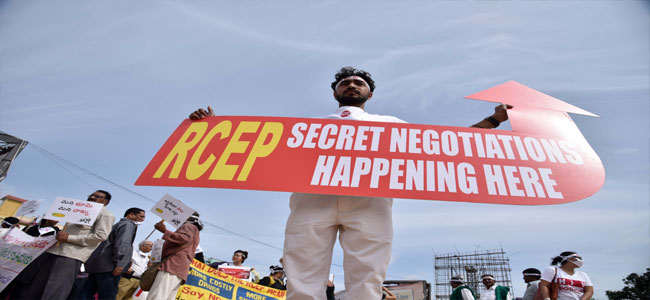‘Big boys’ causing delays in conclusion of RCEP

Business Mirror | 12 February 2018
‘Big boys’ causing delays in conclusion of RCEP
by Elijah Felice Rosales
The Philippines is demanding its fellow negotiating-countries in the Regional Comprehensive Economic Partnership (RCEP) to seriously commit to a speedy conclusion of their trade deal, as the latest round of talks still failed to progress beyond trade in goods modalities.
The trade deal that was branded as the strong counterpart of the Trans-Pacific Partnership (TPP) is facing yet another year of tough negotiations, with the “big boys” mostly causing the delays.
“From what I know, the range that Asean [Association of Southeast Asian Nations] countries can commit under zero-tariff rate is between 88 percent and 92 percent. That is easy to understand because we are implementing that already in the Asean,” Trade Undersecretary Ceferino S. Rodolfo Jr. said on Monday.
However, complications arise when the other six negotiating countries—Australia, China, India, Japan, New Zealand and South Korea—enter the picture. Rodolfo said some of these countries do not have existing bilateral free-trade agreements (FTAs) with each other yet, and this slows down the whole process of finalizing the RCEP.
“If it is just us [Asean countries], we have no problem concluding the RCEP because we have existing FTAs with the other six negotiating countries. The problem is with China, New Zealand, Japan and India because they have no FTAs among them,” Rodolfo noted.
Lead negotiators who were in Yogyakarta last week tackled how many percent of their respective country’s tariff lines can be subjected to zero duty upon entry into force of the RCEP.
They, however, failed to touch on the sensitive list of each country, which Trade Secretary Ramon M. Lopez and his counterparts in the region hoped would be discussed already in the Indonesia talks.
As much as Rodolfo is still optimistic the trade deal could be concluded this year, he said its fate lies on the determination of each country to finalize it. He added that he hopes the momentum gained in the RCEP negotiations in Manila last year “would really pressure the other RCEP partners to come forward” and level with the majority’s expectations.
“I think substantially [the RCEP will be concluded] this year in Singapore,” Rodolfo said. He clarified, though, that when he says “substantially,” he was referring to the objectives of the talks this year, one of which is the identification of products to be immediately placed under zero duty once the RCEP is implemented.
On top of this, Rodolfo confirmed the government will be pushing for the inclusion of agricultural products, mostly staple—such as rice, sugar and garlic—under the country’s sensitive list. Products on the sensitive list will have its tariff reduction take effect in a much-longer period to allow the domestic industries to adjust.
A country considers a product sensitive if it cannot subject it to competition with imports. In the case of the Philippines, the government usually marks rice and sugar as sensitive products because their foreign counterparts are priced cheaper in the market.
“Between agricultural and industrial products, our country is more sensitive, like in any trade negotiation, on agricultural products. We are more sensitive on that,” Rodolfo admitted.
The RCEP is the free-trade agreement between Australia, China, India, Japan, New Zealand, South Korea and the 10 member-states of the Asean. It covers trade in goods, trade in services, investment, economic and technical cooperation, intellectual property, competition, e-commerce, dispute settlement and other trade issues.
The trade deal is positioned as the counterpart of the Trans-Pacific Partnership (TPP), which gained significant headway in January even with the United States backing out. The amended version of the TPP is scheduled to be signed by its 11 negotiating countries in March.





